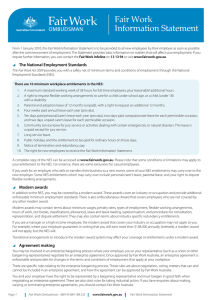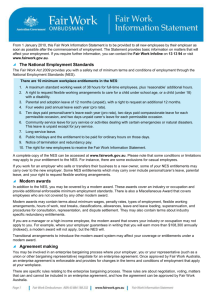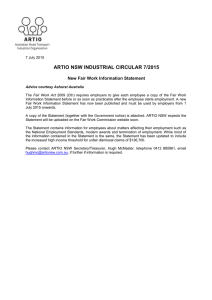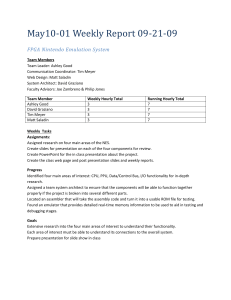Maximum weekly hours - Fair Work Ombudsman
advertisement
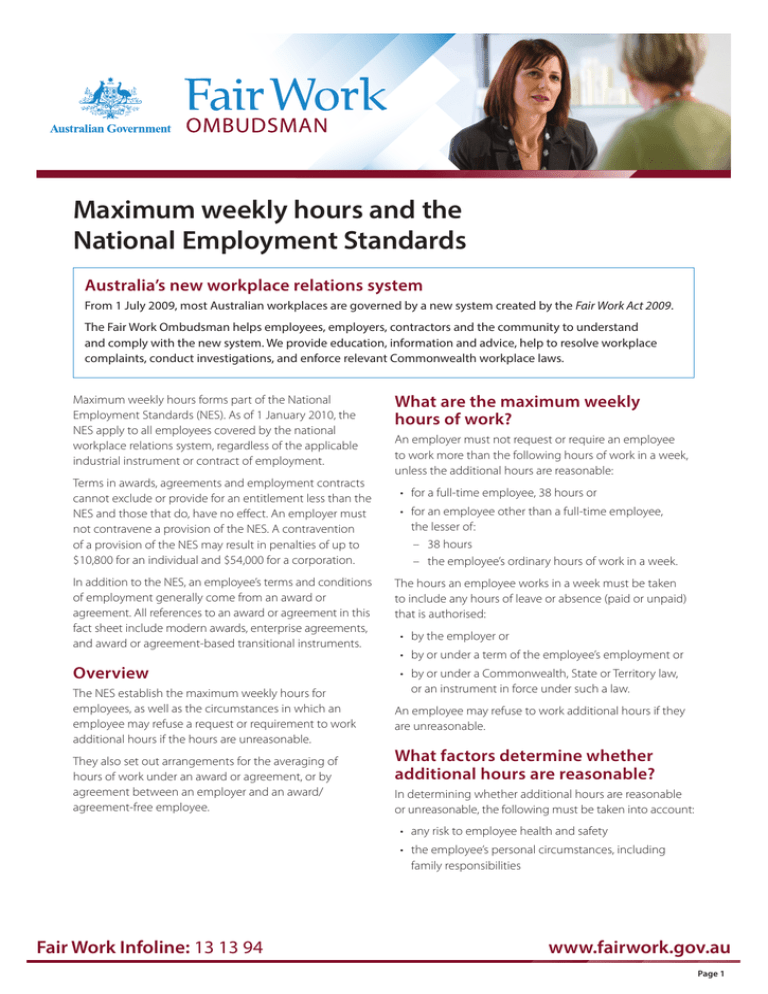
Maximum weekly hours and the National Employment Standards Australia’s new workplace relations system From 1 July 2009, most Australian workplaces are governed by a new system created by the Fair Work Act 2009. The Fair Work Ombudsman helps employees, employers, contractors and the community to understand and comply with the new system. We provide education, information and advice, help to resolve workplace complaints, conduct investigations, and enforce relevant Commonwealth workplace laws. Maximum weekly hours forms part of the National Employment Standards (NES). As of 1 January 2010, the NES apply to all employees covered by the national workplace relations system, regardless of the applicable industrial instrument or contract of employment. Terms in awards, agreements and employment contracts cannot exclude or provide for an entitlement less than the NES and those that do, have no effect. An employer must not contravene a provision of the NES. A contravention of a provision of the NES may result in penalties of up to $10,800 for an individual and $54,000 for a corporation. In addition to the NES, an employee’s terms and conditions of employment generally come from an award or agreement. All references to an award or agreement in this fact sheet include modern awards, enterprise agreements, and award or agreement-based transitional instruments. Overview The NES establish the maximum weekly hours for employees, as well as the circumstances in which an employee may refuse a request or requirement to work additional hours if the hours are unreasonable. They also set out arrangements for the averaging of hours of work under an award or agreement, or by agreement between an employer and an award/ agreement-free employee. What are the maximum weekly hours of work? An employer must not request or require an employee to work more than the following hours of work in a week, unless the additional hours are reasonable: • for a full-time employee, 38 hours or • for an employee other than a full-time employee, the lesser of: –– 38 hours –– the employee’s ordinary hours of work in a week. The hours an employee works in a week must be taken to include any hours of leave or absence (paid or unpaid) that is authorised: • by the employer or • by or under a term of the employee’s employment or • by or under a Commonwealth, State or Territory law, or an instrument in force under such a law. An employee may refuse to work additional hours if they are unreasonable. What factors determine whether additional hours are reasonable? In determining whether additional hours are reasonable or unreasonable, the following must be taken into account: • any risk to employee health and safety • the employee’s personal circumstances, including family responsibilities Fair Work Infoline: 13 13 94 www.fairwork.gov.au Page 1 • the needs of the workplace or enterprise Illustrative example • whether the employee is entitled to receive overtime payments, penalty rates or other compensation for (or a level of remuneration that reflects an expectation of ) working additional hours The award regulating Malcolm’s employment includes averaging arrangements in relation to hours of work, so that full-time employees would ordinarily work 152 hours over four weeks (an average of 38 hours per week). Over a four week period, Malcolm’s work pattern is as follows: • any notice given by the employer to work the additional hours • any notice given by the employee of his or her intention to refuse to work the additional hours Week 1 – worked 21 hours Week 2 – worked 60 hours • the usual patterns of work in the industry Week 3 – worked 38 hours • the nature of the employee’s role and the employee’s level of responsibility Week 4 – worked 33 hours • whether the additional hours are in accordance with averaging provisions included in an award or agreement that is applicable to the employee, or an averaging arrangement agreed to by an employer and an award/agreement-free employee • any other relevant matter. What averaging arrangements can apply to hours of work? Averaging of hours of work under awards or agreements An award or agreement may include provisions for the averaging of hours of work over a specified period that is greater than a week. The average weekly hours over the period must not exceed: • for a full-time employee, 38 hours or • for an employee other than a full-time employee, the lesser of: –– 38 hours –– the employee’s ordinary hours of work in a week. An award or agreement can provide for average weekly hours that are greater than the hours above if those additional hours are considered reasonable. In either case, hours worked in excess of the above average weekly hours will be treated as additional hours. The averaging provisions are relevant in determining whether the additional hours are reasonable or not. Fair Work Infoline: 13 13 94 The averaging arrangement would be relevant in determining the reasonableness of the additional 22 hours that Malcolm was required to work in Week 2. Other factors such as Malcolm’s family responsibilities, his health and safety, and the notice he was given of having to work the additional 22 hours would also be relevant. Averaging of hours of work for award/ agreement free employees Employers and award/agreement-free employees may agree in writing to an averaging arrangement to average their ordinary hours of work. However, the maximum averaging period is 26 weeks. Again, the average weekly hours over the period must not exceed: • for a full-time employee, 38 hours or • for an employee other than a full-time employee, the lesser of: –– 38 hours –– the employee’s ordinary hours of work in a week. Alternatively, the agreement can provide for average weekly hours that are greater than the hours above if those additional hours are considered reasonable. In either case, hours worked in excess of the above in a week will be treated as additional hours. The averaging arrangement agreed between the employer and employee will be relevant in determining whether the additional hours are reasonable or not. www.fairwork.gov.au Page 2 Do I have to enter into an averaging arrangement? There is no requirement for an employer and employee to enter into an averaging arrangement. Under the general workplace protections provisions of the Fair Work Act 2009, it is unlawful for an employer to force (or try to force) an employee to make (or not make) an averaging arrangement. The Fair Work Ombudsman can investigate allegations of contraventions of the general protections provisions. Where identified, the Fair Work Ombudsman can initiate legal action for penalties of up to $10,800 for an individual and $54,000 for a corporation. For more information on general protections, please see the Fair Work Ombudsman Fact Sheet – General workplace protections. Further information Maximum weekly hours are provided for by sections 62–64 of the Fair Work Act 2009. The Fair Work Ombudsman has published a fact sheet on each NES entitlement. For further information on a specific NES entitlement, please see the relevant fact sheets at www.fairwork.gov.au. For further information, visit www.fairwork.gov.au or contact the Fair Work Infoline on 13 13 94. Related publications Introduction to the NES Requests for flexible working arrangements and the NES Parental leave and related entitlements and the NES Annual leave and the NES Personal/carer’s leave and compassionate leave and the NES Community service leave and the NES Long service leave and the NES Public holidays and the NES Notice of termination and redundancy pay and the NES Fair Work Information Statement and the NES Contact us Fair Work Online: www.fairwork.gov.au Fair Work Infoline: 13 13 94 Need language help? Contact the Translating and Interpreting Service (TIS) on 13 14 50 Hearing & speech assistance Call through the National Relay Service (NRS): • For TTY: 13 36 77. Ask for the Fair Work Infoline 13 13 94 • Speak & Listen: 1300 555 727. Ask for the Fair Work Infoline 13 13 94 Fair Work Infoline: 13 13 94 The Fair Work Ombudsman is committed to providing you with advice that you can rely on. The information contained in this fact sheet is general in nature. If you are unsure about how it applies to your situation you can call our Infoline on 13 13 94 or speak with a union, industry association or a workplace relations professional. www.fairwork.gov.au Last updated: July 2015 © Copyright Fair Work Ombudsman FWOFS18.04 Page 3
